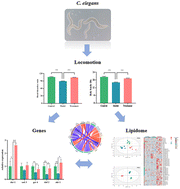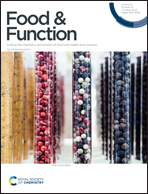Lipidome reveals the alleviation of acrylamide-induced impairment by krill oil†
Abstract
Krill oil is rich in polyunsaturated fatty acids and has various biological functions. Previous research studies have demonstrated that krill oil is helpful to improve locomotion via antioxidation and regulation of energy metabolism, but the alteration of relevant lipids and mechanisms still remains unclear. In this study, we observed recovery in the impairment of Caenorhabditis elegans (C. elegans) caused by acrylamide using the krill oil. Locomotion assays indicated that the supplement of krill oil enhanced head thrashes and body bends by 16.4% and 19.3% respectively in impaired C. elegans. The altered expressions of genes related to neuron status (dat-1), antioxidants (sod-3 and gst-4) and energy metabolism (daf-2 and akt-1) in impaired C. elegans were also reversed by treatment with krill oil. Lipidomics analysis suggested that krill oil could restore the metabolic changes induced by acrylamide, including the downregulation of ceramides and fatty acids and the upregulation of glycerophospholipids containing polyunsaturated fatty acids. Some of these lipids also showed significant correlations with the varied genes. In conclusion, krill oil could ameliorate the locomotion of impaired C. elegans via suppressing the oxidative stress and promoting energy supply. Our findings facilitate the functional studies of krill oil.

- This article is part of the themed collection: Food & Function HOT Articles 2022


 Please wait while we load your content...
Please wait while we load your content...